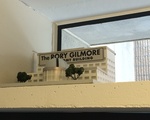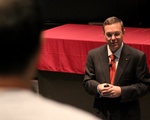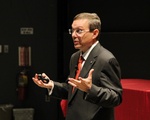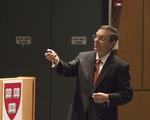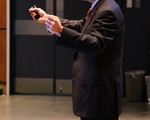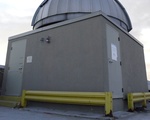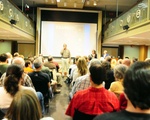Astronomy
Harvard Thinks Big VI
My eyes are tearing up as I make my way up to the balcony seats in Sanders Theater. Not because I’m overly excited by the prospect of Harvard Thinks Big VI, but because it is cold as hell, and my eyes haven’t stopped watering since I stepped outside.
Lab Rat of the Week: Kirshner Aims For Stars
Astronomy Professor Robert P. Kirshner was awarded the 2015 Wolf Prize for his work proving that the universe is growing at an increasing rate.
Scientists Map out Bubbly Interior of a Nearby Former Star
A group of astronomers produced a three-dimensional map of a supernova's interior.
Harvard Team's Big Bang Findings Called into Question
Findings from the European Space Agency’s Planck satellite indicate that the data collected by Harvard’s telescope, BICEP2, did not completely account for galactic dust.
Primitive Intelligent Life
Dr. Abraham A. Loeb, the Chair of the Harvard Astronomy Department, describes the likelihood of discovering extraterrestrial life on Tuesday evening in the Scenic Center.
Primitive Intelligent Life
Dr. Abraham A. Loeb, the chair of the Harvard Astronomy Department, describes the likelihood of discovering extraterrestrial life on Tuesday evening in the Science Center.
Primitive and Intelligent Life Lecture
Dr. Abraham A. Loeb, the chair of the Harvard Astronomy department, describes the possibility of discovering extraterrestrial life on Tuesday evening in the Science Center.
Astronomy Chair Breaks Down Search for Other Life Forms
Abraham "Avi" Loeb highlighted several modern strategies for finding extraterrestrial life Tuesday.
Primitive Intelligent Life
Dr. Abraham A. Loeb, the Chair of the Harvard Astronomy Department, describes the likelihood of discovering extraterrestrial life on Tuesday evening in the Scenic Center.
Stargaze at the Museum of Science
Enjoy a great view of the stars at the Gilliland Observatory free of charge on Friday evenings. The observatory is located on the roof of the Boston Museum of Science's parking garage.
Researchers Discover New Earth-Sized Planet
A team of scientists, including Harvard Lecturer in Astronomy David W. Latham, discovered Kepler 78b, a planet outside of our solar system that is a “virtual twin of Earth by astronomical standards."
Center for Astrophysics Workers Furloughed Following Government Shutdown
As debate over the federal government shutdown continues in Washington, funding for the Harvard-Smithsonian Center for Astrophysics has dried up and approximately 100 federal workers at the Center have been sent home.
Astronomers Discover Exoplanets Covered by Oceans
Harvard astronomers have discovered two exoplanets in the recently found Kepler-62 planetary system that are covered in endless oceans of water, making them viable candidates for sustaining life.
Searching for Supernovae
The trip, which is an optional part of Astronomy 100, allows undergraduate students to work with Harvard Astronomy’s Supernova Forensics group to identify and learn more about the nature of supernovae, or stellar explosions. But more than supplementing students’ academic material, the course’s unique spring break trip gives students a glimpse into the lives of professional astronomers.




